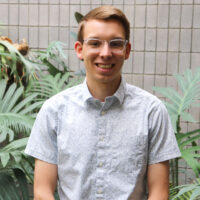
“Biological Ballistics”: Optimizing Biolistic Transformation in Hornwort Model Species Anthoceros agrestis
Upon transitioning from an aquatic to a terrestrial environment approximately 500 million years ago, land plants diverged into two major groups, vascular plants and bryophytes. Hornworts, along with liverworts and mosses, make up the bryophytes, which are sister to vascular plants. Despite the insights hornworts could provide to better understanding early land plant evolution, much about the biology of hornworts remains to be studied. It is known that hornworts are the only land plants to contain pyrenoids within their chloroplasts, which function to concentrate CO2 in the nearby environment of RuBisCo, leading to more efficient photosynthesis by reducing the rate of photorespiration. Hornworts also have a symbiotic relationship with cyanobacteria, which fix atmospheric nitrogen for the plant. Integrating these features into crops could have implications for increasing yields and decreasing fertilizer dependency. In order to study the genes responsible for these features, a biolistic transformation method was employed for hornwort model species Anthoceros agrestis. While the current protocol has been used to successfully transform these plants, the efficiency remains low. Four variables in the current biolistic procedure were tested in order to optimize the current protocol: the amount of DNA used, the shooting distance, the DNA precipitation method, and the days post-homogenization. The results of this project aid in the understanding of which factors have the largest influence on the successful transformation rate and could be useful for studying pyrenoids and cyanobacteria symbiosis in the future.
This internship has been a great introduction into what it might be like to conduct research in the realm of plant genetic engineering full-time. I’ve gained experience with biolistic transformation, conducting minipreps, PCR, and using golden gate cloning that will be useful in the future as I pursue graduate school and a career in this field. I’ve learned how to identify problems, adapt procedures, and to remain patient and optimistic when results end up less than ideal while running experiments. Further, I now have a better understanding of the expectations of professional research and how to effectively present my results to various audiences. I’m very grateful to have had this internship opportunity this summer and am excited to see where these new research skills can take me.
